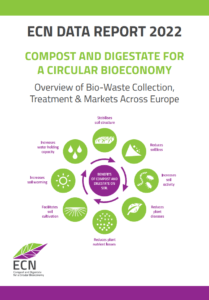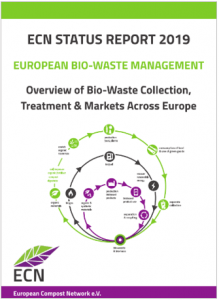 The ECN released a data report for 2022. The new report verifies that less than 40 million tonnes of municipal bio-waste are separately collected and processed into high-quality compost and digestate in Europe. This means that only 17% of municipal solid waste is organically recycled through composting and anaerobic digestion. For reaching the overall recycling target of municipal waste of 65% by 2035, there is a need to set further incentives to improve the separate collection and the biological management of bio-waste at the European level.
The ECN released a data report for 2022. The new report verifies that less than 40 million tonnes of municipal bio-waste are separately collected and processed into high-quality compost and digestate in Europe. This means that only 17% of municipal solid waste is organically recycled through composting and anaerobic digestion. For reaching the overall recycling target of municipal waste of 65% by 2035, there is a need to set further incentives to improve the separate collection and the biological management of bio-waste at the European level.
Across the European Union, somewhere between 118 and 138 million tons of bio-waste arise annually, of which currently only about 40% (equivalent to 47,5 million tons per annum [M tpa]) is effectively recycled into high-quality compost and digestate. As up to 50% of municipal solid waste is organic, the bio-waste fraction plays an important role in recycling and the nascent circular economy. Implementation of separate collection of bio-waste in all EU member states as laid down in the Waste Framework Directive is a key for diverting organic waste from landfills and to guarantee that high-quality secondary raw materials (composts and digestate) are consistently manufactured, so that they can be placed on the European fertilizer market.
The majority of municipal waste generated in Europe is still disposed of through landfilling (24%) or incineration (27%), with less than half recycled (31%) and composted (17 %) [EUROSTAT]. According to the European Environment Agency (EEA, 2013), recycling of glass, paper and cardboard, metals and plastics has increased in recent years. On the other hand, there has been no corresponding increase in bio-waste recycling based on the reporting data.
Using EUROSTAT municipal waste data, and assuming that about 34% of municipal waste is bio-waste, this means that somewhere in the region of 75 million tonnes of bio-waste from municipal waste is created every year across Europe (EU 27). For achieving the overall recycling target of 65 % of municipal waste by 2035, it is crucial that recycling of bio-waste has to take place (EEA, 2020).
You can find the report here and the summary here!
ECN's Status Report 2019
 The recent survey by the European Compost Network indicated that in 2016/2017 47,5 million tonnes of municipal bio-waste was separately collected and composted and/or digested. Notably, these figures exclude the significant quantities of food residues (41 million tonnes) which are produced industrially during food manufacture.
The recent survey by the European Compost Network indicated that in 2016/2017 47,5 million tonnes of municipal bio-waste was separately collected and composted and/or digested. Notably, these figures exclude the significant quantities of food residues (41 million tonnes) which are produced industrially during food manufacture.
The article ‘Compost Production in Europe’ gives an overview on bio-waste management in Europe and can be accessed here.
The ECN Status report 2019 ‘European Bio-waste Management – Overview of Bio-waste Collection, Treatment & Markets Across Europe’ can be ordered as pdf- version at the ECN office.
- Separate Collection of Bio-Waste
- Treatment of Bio-Waste in Europe
- Perspective for Bio-Waste Management in Europe
